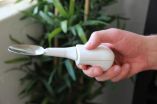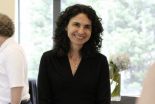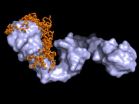(Press-News.org) ANN ARBOR, Mich. — For people whose hands shake uncontrollably due to a medical condition, just eating can be a frustrating and embarrassing ordeal – enough to keep them from sharing a meal with others.
But a small new study conducted at the University of Michigan Health System suggests that a new handheld electronic device can help such patients overcome the hand shakes caused by essential tremor, the most common movement disorder.
In a clinical trial involving 15 adults with moderate essential tremor, the device improved patients' ability to hold a spoon still enough to eat with it, and to use it to scoop up mock food and bring it to their mouths.
The researchers measured the effect three ways: using a standard tremor rating, the patients' own ratings, and digital readings of the spoon's movement.
The results are published online in the journal Movement Disorders by a research team that includes U-M neurologist and essential tremor specialist Kelvin Chou, M.D., as well as three people from the small startup company, Lift Labs, that makes the device, called Liftware. The study was funded by a Small Business Innovation Research grant from the National Institutes of Health that the researchers applied for together.
Public-private partnership – with a Michigan difference
The technology came full circle to its test in the UMHS clinic. The company's CEO, Anupam Pathak, Ph.D., received his doctorate from the U-M College of Engineering – where he first worked on tremor-cancelling advanced microelectronic technologies for other purposes.
The concept is called ACT, or active cancellation of tremor. It relies on tiny electronic devices that work together to sense movement in different directions in real time, and then make a quick and precise counter-motion.
Lift Labs, based in San Francisco, developed the device, which resembles an extra-large electronic toothbrush base. It can adjust rapidly to the shaking of the user's hand, keeping a detachable spoon or other utensil steady. In other words, it shakes the spoon in exactly the opposite way that the person's hand shakes.
But to truly test whether their prototype device could help essential tremor patients overcome their condition's effects, the Lift Labs team turned to Chou, who with his colleagues sees hundreds of essential tremor patients a year.
UMHS offers comprehensive care for the condition as part of its Movement Disorders Center. Chou and his colleagues have experience in prescribing a range of medication to calm tremors, and evaluating which patients might benefit from advanced brain surgery to implant a device that can calm the uncontrollable nerve impulses that cause tremor.
"Only about 70 percent of patients respond to medication, and only about 10 percent qualify for surgery, which has a high and lasting success rate," says Chou, who is an associate professor in the U-M Medical School's departments of Neurology and Neurosurgery. "People get really frustrated by tremor, and experience embarrassment that often leads to social isolation because they're always feeling conscious not just eating but even drinking from a cup or glass."
The trial, Chou says, showed that the amplitude of movement due to the tremor decreased measurably, and that patients could move the spoon much more normally. Though the trial did not include patients with hand tremors caused by other movement disorders such as Parkinson's disease, the device may be useful to such patients too, he notes.
Says Pathak, "A key aspect of Liftware is a design with empathy. We hear of people struggling every day, and decided to apply technology in a way to directly help. We hope the final product is something people can feel proud of using, and allow them to regain independence and dignity."
How the study was done
The researchers tested the device's impact both with the microelectronics turned on, and with them turned off so there was no correction for movement. Patients and Chou could not tell by feeling the device whether it was on or off.
All three measures – objective rating by Chou, subjective rating by patients, and digital data from the device's connection to a computer – showed improvement for eating and transferring items when the device was turned on, compared to when it was off.
When the patients were asked to simply hold the spoon halfway between the table and their mouth, the two objective measures showed improvement when the device was on, though the patients didn't report a significant difference themselves.
"Our data show this device has very good potential to assist those who have tremor and aren't candidates for surgery," he says. "Compared with other devices designed to limit tremor by weighting or constraining limbs, this approach allows movement and is easier to use."
The study included 15 adults between the ages of 59 and 80 whose tremor caused them to spill food or drink. They had experienced tremor for anywhere from 5 years to 57 years. All of the patients stopped taking their medication temporarily before testing the Liftware device. Five of the patients had undergone deep brain stimulation, but turned off their tremor-controlling implant for the study.
INFORMATION: Lift Labs is now developing other attachments for the Liftware device, and working with the International Essential Tremor Foundation to raise money to give devices to people with essential tremor who cannot afford the $295 price of a base unit.
In addition to Chou, who does not have a business relationship with Lift Labs, and Pathak, who co-holds two U-M patents with others who developed the ACT approach, the research team included Lift Labs' John A. Redmond, Ph.D., and Michael Allen. The research was funded by NIH SBIR grant 5R44NS070438. Chou is the Thomas H. and Susan C. Brown Early Career Professor of Neurology.
For more information on essential tremor care at UMHS, visit http://umhealth.me/esstrem
More information on the Liftware product is available at http://www.liftlabsdesign.com .
Citation: Movement Disorders, DOI: 10.1002/mds.25796
Shaky hand, stable spoon: U-M study shows device helps essential tremor patients
U-M engineering alumni's company developed shake-canceling device
2014-02-28
ELSE PRESS RELEASES FROM THIS DATE:
A molecular ballet under the X-ray laser
2014-02-28
An international team of researchers has used the world's most powerful X-ray laser to take snapshots of free molecules. The research team headed by Prof. Jochen Küpper of the Hamburg Center for Free-Electron Laser Science (CFEL) choreographed a kind of molecular ballet in the X-ray beam. With this work, the researchers have cleared important hurdles on the way to X-ray images of individual molecules, as they explain in the scientific journal Physical Review Letters. CFEL is a cooperation of DESY, the University of Hamburg, and the Max Planck Society.
"We have captured ...
Indonesia's competitiveness at risk from neglected diseases of poverty
2014-02-28
WASHINGTON, D.C. – February 27, 2014 – The control and elimination of neglected tropical diseases (NTDs) is one of the most cost-effective ways Indonesia can sustain economic growth and reduce inequality, said scientists today in an analysis published in PLOS Neglected Tropical Diseases. While Indonesia is poised to defeat NTDs by 2020, it has an opportunity to scale up national programs, integrate NTDs with other development efforts, strengthen coordination and enhance collaboration among key partners.
The analysis calls NTDs "one of the most potent forces" trapping ...
NASA saw rainfall rates increase before birth of Tropical Storm Faxai
2014-02-28
VIDEO:
NASA/JAXA's TRMM Satellite provided data of developing Tropical Storm Faxai to make this 3-D image that showed some towering thunderstorms in the area were reaching altitudes of up to 15.5km/~9.6...
Click here for more information.
The Tropical Rainfall Measuring Mission or TRMM satellite passed over System 93W in the Northwestern Pacific Ocean and saw rainfall rates increasing on February 27 in the developing tropical low pressure area. On February 28, the low organized ...
Peat soils as gigantic batteries
2014-02-28
This news release is available in German. Wetlands, including peatlands, have a high content of humic substances, which are organic compounds that form during incomplete decomposition of biomass. Under anoxic conditions, soil bacteria can use these organic compounds during respiration as electron acceptors. Many organisms (including us humans) instead use oxygen as the electron acceptor.
In the mid-1990s, researchers revealed that some anaerobic microorganisms in soils and sediments use humic substances as electron acceptors under anoxic conditions. However, the capacity ...
Giant sunspot makes third trip across the sun
2014-02-28
A giant sunspot – a magnetically strong and complex region on the sun's surface – has just appeared over the sun's horizon. This is the third trip for this region across the face of the sun, which takes approximately 27 days to make a complete rotation.
Scientists track sunspots that are part of active regions, which often produce large explosions on the sun such as solar flares and coronal mass ejections, or CMEs. Each time an active region appears it is assigned a number. Active regions that have survived their trip around the back of the sun and reappear are assigned ...
New fast and furious black hole found
2014-02-28
A team of Australian and American astronomers have been studying nearby galaxy M83 and have found a new superpowered small black hole, named MQ1, the first object of its kind to be studied in this much detail.
Astronomers have found a few compact objects that are as powerful as MQ1, but have not been able to work out the size of the black hole contained within them until now.
The team observed the MQ1 system with multiple telescopes and discovered that it is a standard-sized small black hole, rather than a slightly bigger version that was theorised to account for all ...
Researchers discover unusual genetic mutation linked to adolescent liver cancer
2014-02-28
In the race for better treatments and possible cures, rare diseases are often left behind. In a collaboration of researchers at The Rockefeller University, Memorial Sloan Kettering Cancer Center and the New York Genome Center (NYGC), an unusual mutation has been found that is strongly linked to one such disease: a rare liver cancer that affects teens and young adults. The results, published this week in Science, suggest that the mutation plays a key role in the development of the disease, called fibrolamellar hepatocellular carcinoma, and may also underlie more common cancers ...
Retention leads to discipline problems in other kids
2014-02-28
DURHAM, N.C -- When students repeat a grade, it can spell trouble for their classmates, according to a new Duke University-led study of nearly 80,000 middle-schoolers.
In schools with high numbers of grade repeaters , suspensions were more likely to occur across the school community. Discipline problems were also more common among other students, including substance abuse, fighting and classroom disruption.
Public debate typically focuses on how retention affects an individual student's academic performance, said lead author Clara Muschkin. So she and her colleagues ...
Dangerous mistaken identity
2014-02-28
This news release is available in German.
Proteins like the so-called heat shock protein Hsp90 play an important role in almost all processes within human cells. They help other proteins fold into their three-dimensional structure or return damaged proteins back into their proper shape.
Recently, there has been increasing evidence indicating that the heat shock protein HSP90 may also be involved in the folding processes of the tau protein. Deposits of tau proteins in brain cells are typical for Alzheimer's disease and are held responsible for decaying nerve ...
Diabetes and obesity more common in socioeconomically deprived regions
2014-02-28
Living in a socioeconomically deprived region is a risk factor for being affected by diabetes mellitus and obesity. This holds true regardless of the individual social status of the inhabitants. This is the conclusion reached by scientists from the Institute of Health Economics and Health Care Management (IGM) at the Helmholtz Zentrum München (HMGU) and the Department of Epidemiology and Health Monitoring at the Robert Koch Institute (RKI) in Berlin. "Regional factors, such as the population's average income, unemployment or quality of the living environment can affect ...
LAST 30 PRESS RELEASES:
ACES marks 150 years of the Morrow Plots, our nation's oldest research field
Physicists open door to future, hyper-efficient ‘orbitronic’ devices
$80 million supports research into exceptional longevity
Why the planet doesn’t dry out together: scientists solve a global climate puzzle
Global greening: The Earth’s green wave is shifting
You don't need to be very altruistic to stop an epidemic
Signs on Stone Age objects: Precursor to written language dates back 40,000 years
MIT study reveals climatic fingerprints of wildfires and volcanic eruptions
A shift from the sandlot to the travel team for youth sports
Hair-width LEDs could replace lasers
The hidden infections that refuse to go away: how household practices can stop deadly diseases
Ochsner MD Anderson uses groundbreaking TIL therapy to treat advanced melanoma in adults
A heatshield for ‘never-wet’ surfaces: Rice engineering team repels even near-boiling water with low-cost, scalable coating
Skills from being a birder may change—and benefit—your brain
Waterloo researchers turning plastic waste into vinegar
Measuring the expansion of the universe with cosmic fireworks
How horses whinny: Whistling while singing
US newborn hepatitis B virus vaccination rates
When influencers raise a glass, young viewers want to join them
Exposure to alcohol-related social media content and desire to drink among young adults
Access to dialysis facilities in socioeconomically advantaged and disadvantaged communities
Dietary patterns and indicators of cognitive function
New study shows dry powder inhalers can improve patient outcomes and lower environmental impact
Plant hormone therapy could improve global food security
A new Johns Hopkins Medicine study finds sex and menopause-based differences in presentation of early Lyme disease
Students run ‘bee hotels’ across Canada - DNA reveals who’s checking in
SwRI grows capacity to support manufacture of antidotes to combat nerve agent, pesticide exposure in the U.S.
University of Miami business technology department ranked No. 1 in the nation for research productivity
Researchers build ultra-efficient optical sensors shrinking light to a chip
Why laws named after tragedies win public support
[Press-News.org] Shaky hand, stable spoon: U-M study shows device helps essential tremor patientsU-M engineering alumni's company developed shake-canceling device






